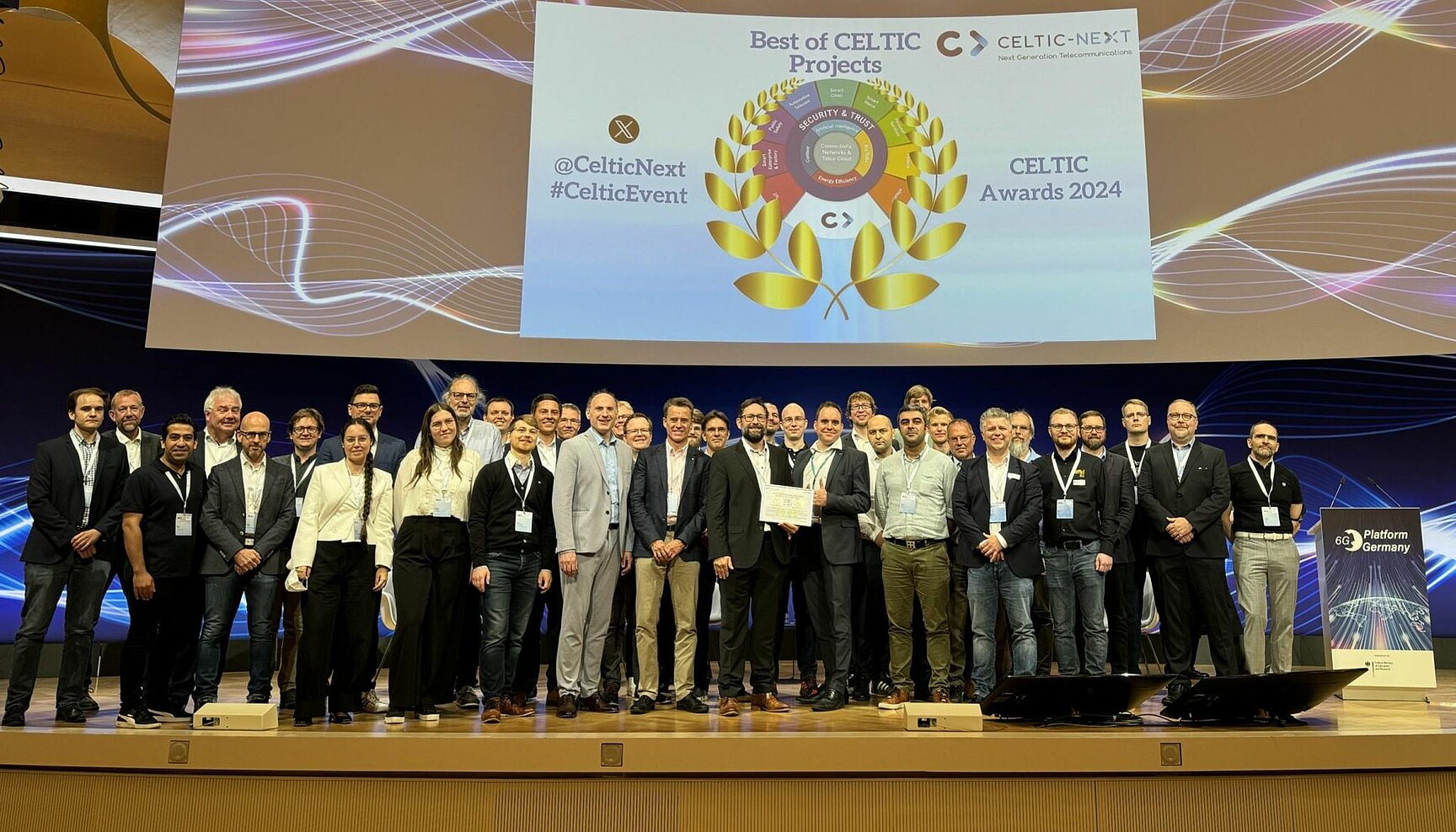July 24, 2024
The AI-NET project received the prestigious "CELTIC-NEXT Innovation Award" at the Berlin 6G Conference (July 2 to 4, 2024). The prize is awarded by CELTIC-NEXT, an industry-driven initiative for ICT technologies focusing on secure and sustainable communication. The recognition is based on an excellent evaluation following an assessment by the CELTIC-NEXT reviewers. AI-NET is a collaboration between seven European countries that developed and brought to application novel solutions for the automation of optical communication networks. The project started in June 2021 and concluded in June 2024. It is funded with 68.4 million euros by the German Federal Ministry of Education and Research, the Swedish Governmental Agency for Innovation Systems Vinnova, UK Research and Innovation UKRI, Business Finnland, BPI France, the Netherlands Ministry of Economic Affairs and Climate EZK, and the Polish National Center for Research and Development NCBR.
Digital transformation transforms many vital areas such as smart cities, robotics, transportation, and next-generation industries. At the same time, the previously centralized cloud infrastructure is inadequate to serve the transformation’s requirements.
AI-NET’s (Accelerating Digital Transformation in Europe by Intelligent NETwork Automation) aim is to support the acceleration of digital transformation in Europe by designing an edge platform for intelligent network automation to meet these growing demands. The project combines three key technology areas: communication networks for 5G and future 6G, edge data centers, and Artificial Intelligence (AI).
Fraunhofer HHI was able to contribute its expertise by leading the third work package of the project with a focus on “AI-supported network control and service automation”. Furthermore, Fraunhofer HHI spearheaded the final demonstration that integrated the various partners’ project’s results on Fraunhofer HHI’s large-scale SDN-enabled photonics testbed located in Berlin.
Moreover, Fraunhofer HHI developed a range of innovative technologies during the project. These include a “High-speed THz Outdoor-Link” in collaboration with Fraunhofer IAF, TU Berlin, and VPIphotonics, a “Neuromorphic Computing Chip” for network quality monitoring with AMO GmbH and ID Photonics GmbH, as well as “Data Sovereign Telemetry Framework” for comprehensive monitoring of IP/Optical infrastructure in collaboration with Fraunhofer ISST and Adtran Networks SE. Furthermore, the "Distributed Learning Framework (DLFi)" was developed, an AI service platform for the secure and federated training of machine learning models. Fraunhofer HHI also hosted the review meetings (mid-term review and final review).
Fraunhofer HHI plans to exploit the project results in follow-up projects with partners from academia and industry. For instance, the integrated testbed from the final demonstration will be used for developments in the upcoming CELTIC-NEXT flagship project SUSTAINET, which was also announced at the Berlin 6G Conference.
Fraunhofer HHI was a part of the sub-project AI-NET-PROTECT. The project’s goal was to examine and develop concepts, network architectures and methods for automated and secure network operation in critical infrastructures. Under the leadership of Adtran Networks SE, AI-NET PROTECT brought together many partners from research and industry: GWDG - Gesellschaft für wissenschaftliche Datenverarbeitung mbH Göttingen, genua gmbh, Deutsches Forschungszentrum für Künstliche Intelligenz (DFKI), Kiel University, TU Chemnitz, Technical University of Munich, Ulm University, dacoso GmbH, BISDN GmbH, Infosim®, AMO GmbH, The University of Göttingen, TU Darmstadt, TU Dresden, TU Berlin, University of Koblenz, consistec Engineering & Consulting GmbH, ID Photonics GmbH, VPIphotonics, ysura GmbH, Telia, RISE Research Institutes of Sweden, Chalmers University of Technology, Savantic AB, Waystream, Clavister, Lunet AB, FMV - Försvarets materielverk and TNO.

